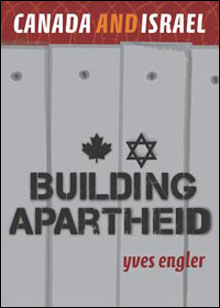Zionism’s roots in Canada are Christian as well. At the time of Confederation Canada’s preeminent Christian Zionist was Henry Wentworth Monk. Monk “took part in the first attempt at a Zionist agricultural settlement in Palestine,” boasts his biography.
To buy Palestine from the Ottomans (Turkey) in 1875 he began the Palestine Restoration Fund. Unsuccessful, seven years later Monk took out an ad in the Jewish World proposing a “Bank of Israel” to finance Jewish resettlement. A history of the Canadian Jewish community explains:
“Henry Wentworth Monk, an eccentric but respected businessman, spent much of his time and money crusading for a Jewish homeland. In the 1870s and 1880s — long before Theodore Herzl, the Austrian founder of Zionism, even thought of a Jewish state — Monk took up a campaign in Canada and England to raise funds to buy land in Palestine for European Jews. In 1881 Monk even proposed setting up a Jewish National Fund. He issued manifestoes, wrote long articles, spoke to assorted meetings and lobbied extensively in England and Canada to realize his dream.”
A speech in England by Anthony Ashley Cooper, Earl of Shaftesbury, in 1839 or 1840 was Monk’s first encounter with Zionist thinking. Shaftesbury, who came up with the infamous Zionist slogan “a land without people for a people without a land,” wanted Jews to go to their “rightful home” (Palestine) under a British protectorate. “The Earl of Shaftesbury was the first millennariast, or restorationist, to blend the biblical interest in Jews and their ancient homeland with the cold realities of [British imperial] foreign policy.” He got Britain’s foreign secretary to appoint the first British consul to Jerusalem in 1839.
For his part, Monk called for the British Empire to establish a “Dominion of Israel”, similar to the Dominion of Canada. “Monk believed that Palestine was the logical center of the British Empire, and could help form a confederation of the English speaking world.” As part of his campaign to have Britain take up the Zionist cause, Monk sent a letter to A.J. Balfour (who became British Foreign Secretary and authored the Balfour Declaration) entitled “Stand Up O Jerusalem.” Monk’s biography notes: “At the end of his life he wrote to Lord Balfour, in 1896, a remarkable letter which contributed to the thinking that led up to the issue of the Balfour Declaration of Palestine 20 years later.” While there is little evidence that Balfour was indeed influenced by Monk, some of his works were read into the Canadian Senate’s records.
Monk was not alone in Canada. “There were a number of others, mostly clergyman but also some politicians and journalists, who took up the Zionist cause in those years.” Leading British Christian Zionist John Nelson Darby made seven missions to Canada and the U.S. between 1862 and 1877 while “for many years, [Charles] Russell’s popular sermons linking biblical prophecy with contemporary events [in Palestine] were reproduced in over 1,500 newspapers in the USA and Canada.” After serving as pastor of the American church in Jerusalem, Reverend Albert Thompson, a Canadian, returned in the 1910s to lecture widely on “the Jewish colonies” in the holy land “turning the wilderness into a very garden of the Lord.” This was supposed to prepare the way for restoration and the second coming of Jesus.
Widely viewed as the father of Jewish Zionism, Austrian-born Theodore Herzl worked closely with leading German Christian Zionist Rev William H. Hechler, chaplain to the British Embassy in Vienna. He arranged for Herzl to meet Germany’s Kaiser Wilhelm II and the Ottoman sultan. Spurred by Christian Zionism, flourishing European nationalist ideologies and growing Western involvement in the Middle East, in 1897 Herzl organized the first Zionist conference in Basel, Austria. The next year Zionist organizations were established in Toronto, Kingston, Winnipeg, Hamilton, Ottawa, Quebec and Montreal. “When the Zionist Federation was formed in Canada there was scarcely a convention that was not attended by a number of leading Canadian Christians, and there were always effusive greetings from Cabinet ministers, mayors, lieutenant governors and other officials.”
In 1910 the president of the Federation of Zionist Societies of Canada, Clarence De Sola, described the fortuitous political climate within which he operated. “The secular press of Canada has always been friendly to the Zionist movement. The Christians in this country, as a rule, are very friendly to Zionism as they see in it the fulfilling of prophecies which they believe in just as we do. Consequently, their newspapers give us very cordial support.”
Citing a mix of Christian and pro-British rationale, leading Canadian politicians repeatedly expressed support for Zionism. In 1907, two Ministers attended the Federation of Zionist Societies of Canada convention, telling delegates that “Zionism had the support of the government.” Solicitor General (and later Prime Minister) Arthur Meighen proclaimed in November 1915: “I think I can speak for those of the Christian faith when I express the wish that God speed the day when the land of your forefathers shall be yours again. This task I hope will be performed by that champion of liberty the world over — the British Empire.”
Excerpt from Canada and Israel: Building Apartheid by Yves Engler published by Fernwood Publishing. Reprinted with permission.
Yves Engler’s book tour starts next week with dates in British Columbia, Alberta and Saskatchewan. For more info visit his website.




